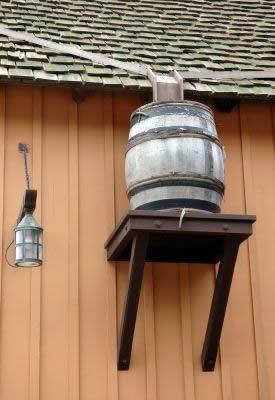Rain Barrel
EXPERT GARDENING ADVICE
Conserve Water with Functional and Visually-Appealing Rain Barrel

If your area experiences water restrictions during dry season and drought, you are surely aware of how precious water really is. Now, would you rather wait until no water comes out from your faucet when you need it so badly? Along with news footage of sun parched lands featured in news reports, and fields and lawns around you suffer the same fate, water shortage problem is difficult to ignore, particularly if you too have invested time, money and hard work in acres of gardens.
Take action. Building a rain barrel is an easy and economical way to conserve water during periods of drought. In fact, a 1,000 square foot roof collects about 600 gallons per inch of rainfall. A rain barrel is a method used to collect and store water from roofs to water gardens, making supply of free “soft water” available for outdoor use. It has nitrogen but contains no chlorine, calcium or lime, making it ideal for flowerpots and gardens. Since lawn and water garden watering make up about 40% of the regular household water use during summer, you can save about 1,300 gallons of water using a rain barrel during peak summer months.
How to Build a Rain Barrel
Building an efficient rain barrel is easy, but some DIY home barrel could be an eyesore. Here are some useful tips in building a functional but visually appealing rain barrel for your home.
A rain barrel has 3 major components such as:
Top hole – to collect water, the top of the barrel must be cut, then insert a skimming basket. The skimmer basket is similar to those used in swimming pools and garden ponds that filter out fallen leaves and other debris. Cover the skimmer basket with fiber glass window screen to prevent disease carrying insects like mosquitoes and bugs from going into the barrel.
- Use the skimmer basket to trace template on barrel.
- Using the 1-inch spade bit, pre-drill a small hole.
- Drill inside the line, then cut out a hole following the inside line using the electric jigsaw. Upper drain – this is the plastic faucet that keeps the barrel from overflowing. Just remember to keep the faucet open.
- From the barrel’s top section, mark holes at about 2 inches. Drill the hole using 1-inch drill bit.
- Screw plastic faucet into the hole. Adjust the hole when necessary using a knife.
- Bind ¾ inch coupling threads with Teflon tape. Apply plumbing sealant then screw onto faucet inside the barrel.
Bottom drain – Attach the plastic faucet to a hose for convenient watering of your gardens and/or lawns. When not in use, keep this faucet close.
- From the bottom of the barrel, mark holes at about 2 inches, then drill a hole following the mark using 1-inch drill bit.
- Attach plastic faucet into the hole. You can adjust hole size using the knife.
- Take the faucet out, wrap up threads in Teflon tape then apply plumbing sealant onto threads. Replace the faucet.
- Reduce leakage by sealing the area where the barrel and faucet convene.
Final Instructions
When attaching hoses, cut 2-inch of its section then push each end into a hose coupler then tighten the screws. The 3-inch section must be screwed onto top outflow faucet, while the 2-inch section to the bottom faucet. Elevate the rain barrel slightly by building a sturdy base. It’s recommended that the barrel sits on ground level since a full barrel can weigh up to 450 lbs. You don’t want to risk it tipping over someone. Adjust downspout and remember to keep the overflow valve open at all times.